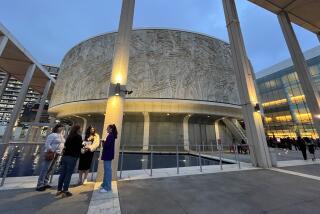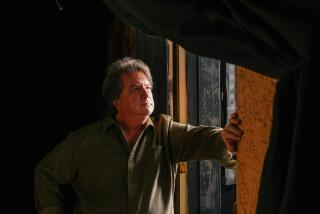Schiller Closure Looms Despite German Protests : Stage: Berlin’s famed theater is falling victim to city budget cutbacks and low attendance; staff works on rescue plan.
- Share via
BERLIN — The banners tied to the outer facade of the city’s famed Schiller Theater are defiant.
“This theater is supposed to close (but) we’re defending ourselves,” reads one.
“Let culture live,” reads another.
Nearby, a long quotation from Bertolt Brecht begins, “Your brother is under attack and you close your eyes. . . .”
But beyond these brave words, a hard reality prevails: the Schiller, historically one of the most important theaters in the German language, is all but dead--targeted for closure by a city government hard-pressed to save money in the wake of reunification.
The June 22 decision to close the Schiller, effective immediately, came as part of a brother $37.6-million cutback in cultural funding that will also shut down the lesser-known Schlosspark Theater in suburban Steglitz and reduce support for one the city’s seven orchestras, the Berlin Symphonic.
The decision to shut the 85-year-old Schiller sent shock waves through the German theatrical community, in part because it was unexpected. The action occurred “in the dead of the night, in an unprecedented way . . ., “ read the statement issued by the theater.
But there is another dimension. That Berlin--a city long seen as a model for government support of the arts, with an annual cultural-affairs budget exceeding $700 million--would kill off the theater that virtually symbolized quality repertoire in the German language for much of its existence, was seen as impossible. Many see the move as an ominous signal that, in a nation that has come under sudden and unaccustomed financial pressures, the performing arts may have become an easy target for public cost-cutting.
“If Germany’s largest theater can be closed, then the defensive barriers for state-subsidized stages everywhere in the country have been weakened,” said Wolfgang Ruf, spokesman for the German Theater Assn. in Cologne.
Founded in 1907, the Schiller was destroyed in a 1943 Allied bombing raid. In its post-World War II heyday from the early 1950s through the early 1970s, the Schiller was blessed with a powerful creative director in Boleslaw Barlog, who mixed classical German pieces with a sprinkling of non-German contributors, including Tennessee Williams, Edward Albee and Samuel Beckett, who directed his own work there in the 1960s.
Initially, the closure prompted a wave of protest. On the night the action was announced, the audience and cast took to the streets, parading in their cars behind a Schiller Theater truck through the Brandenburg Gate with a police escort and, eventually, interrupting performances at three prominent theaters in the eastern part of the city.
Performing artists in the country’s largest state of North-Rhine Westphalia declared a boycott of Berlin, while on the Sunday after the closure announcement, the heads of 80 to 90 German-language theaters from Vienna to Hamburg met on the Schiller stage as a sign of solidarity. It was “a declaration of bankruptcy for a directionless cultural policy,” thundered August Everding, president of the German Theater Assn.
Writing in the national daily, Die Welt, the noted dramatist Rolf Hochhuth commented, “Berlin without the Schiller Theater? Until unification, that was something as unthinkable as Paris without the Eiffel Tower. No longer.”
But after days of growing pressure, Ulrich Roloff-Momin, head of Berlin’s cultural affairs ministry, appeared to have weathered the loudest calls, both for a reversal of the decision and for his own resignation.
More than 50,000 signatures had been gathered nationally under a statement of support for the Schiller, but no money and no concrete rescue proposals came with them; at midweek, members of the theater company admitted their only remaining hope for survival was a lawsuit filed in the city’s constitutional court. A ruling is soon expected on the challenge, which claims the government acted illegally by failing to consult the city legislature--now in summer recess--before ordering the closure.
But as the initial shock of the announcement gradually gives way to deeper reflection, many of those closest to city’s cultural scene admit that a steady decline in the quality of Schiller productions in recent years undoubtedly helped precipitate its apparent demise. Fattened by government support, the Schiller--which received $24.1 million for the present budget year--simply became too content, uninterested in innovation and unresponsive to events going on around it, said some who claim to know it well.
“When too much money is given to art, it’s not good for art,” said Berlin critic Friedrich Dieckmann. “It leads to mediocrity and petty personal battles devoid of artistic value.”
*
Hilmar Thate, one of the Schiller’s best-known actors, said of the theater’s financial support, “It was great to have this kind of money, but it was all too comfortable, too easy. Berlin was a divided city in very special circumstances, but the Schiller never seemed to react to this. When the (Berlin) Wall fell, it was the same thing--the theater went on as if nothing had happened.”
With the Wall down, the Schiller suddenly found itself competing against famous houses in the eastern part of the city, including the Deutsches Theater where Max Reinhardt once held sway, Brecht’s Berliner Ensemble and the Volksbuehne.
During the past year, attendance in the grandiose 1,000-seat Schiller Theater dropped to about 55%.
“Amid all the talk among theater people of Mafia-like tactics, the shortage of artistic quality at the Schiller Theater has suddenly been forgotten,” commented the respected Berlin daily Der Tagesspiegel. Added Frank Castorf, director at the eastern Berlin Volksbuehne, “What do we want with a theater that time and again shows us only that Shakespeare was the greatest poet and Goethe the second greatest?”
Many also blame the Schiller’s decline on a series of disasters involving the theater’s directors; Alfred Kirchner, the most recent director, left prematurely but still got $325,000 compensation--a move that angered many actors.
Nursing a slim hope for survival, the theater’s staff is working on its own rescue plan. It is expected to propose a radically scaled-down autumn season, along with offers on the part of the present acting director, Volkmar Clauss, and some of its leading actors and directors.
“We’re looking for new pieces and reading them,” said Thate. “We’ve got to try for a more intensive use of resources.”
More to Read
The biggest entertainment stories
Get our big stories about Hollywood, film, television, music, arts, culture and more right in your inbox as soon as they publish.
You may occasionally receive promotional content from the Los Angeles Times.










